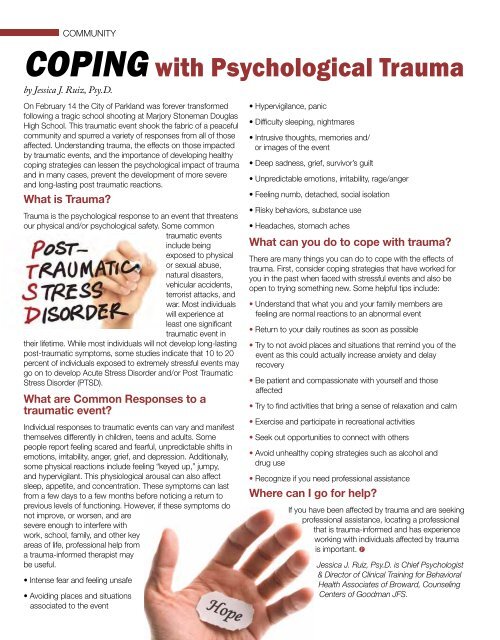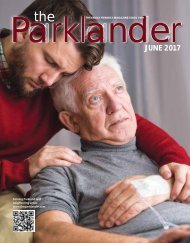April 2018
You also want an ePaper? Increase the reach of your titles
YUMPU automatically turns print PDFs into web optimized ePapers that Google loves.
COMMUNITY<br />
COPING with Psychological Trauma<br />
by Jessica J. Ruiz, Psy.D.<br />
On February 14 the City of Parkland was forever transformed<br />
following a tragic school shooting at Marjory Stoneman Douglas<br />
High School. This traumatic event shook the fabric of a peaceful<br />
community and spurred a variety of responses from all of those<br />
affected. Understanding trauma, the effects on those impacted<br />
by traumatic events, and the importance of developing healthy<br />
coping strategies can lessen the psychological impact of trauma<br />
and in many cases, prevent the development of more severe<br />
and long-lasting post traumatic reactions.<br />
What is Trauma?<br />
Trauma is the psychological response to an event that threatens<br />
our physical and/or psychological safety. Some common<br />
traumatic events<br />
include being<br />
exposed to physical<br />
or sexual abuse,<br />
natural disasters,<br />
vehicular accidents,<br />
terrorist attacks, and<br />
war. Most individuals<br />
will experience at<br />
least one significant<br />
traumatic event in<br />
their lifetime. While most individuals will not develop long-lasting<br />
post-traumatic symptoms, some studies indicate that 10 to 20<br />
percent of individuals exposed to extremely stressful events may<br />
go on to develop Acute Stress Disorder and/or Post Traumatic<br />
Stress Disorder (PTSD).<br />
What are Common Responses to a<br />
traumatic event?<br />
Individual responses to traumatic events can vary and manifest<br />
themselves differently in children, teens and adults. Some<br />
people report feeling scared and fearful, unpredictable shifts in<br />
emotions, irritability, anger, grief, and depression. Additionally,<br />
some physical reactions include feeling “keyed up,” jumpy,<br />
and hypervigilant. This physiological arousal can also affect<br />
sleep, appetite, and concentration. These symptoms can last<br />
from a few days to a few months before noticing a return to<br />
previous levels of functioning. However, if these symptoms do<br />
not improve, or worsen, and are<br />
severe enough to interfere with<br />
work, school, family, and other key<br />
areas of life, professional help from<br />
a trauma-informed therapist may<br />
be useful.<br />
• Intense fear and feeling unsafe<br />
• Avoiding places and situations<br />
associated to the event<br />
• Hypervigilance, panic<br />
• Difficulty sleeping, nightmares<br />
• Intrusive thoughts, memories and/<br />
or images of the event<br />
• Deep sadness, grief, survivor’s guilt<br />
• Unpredictable emotions, irritability, rage/anger<br />
• Feeling numb, detached, social isolation<br />
• Risky behaviors, substance use<br />
• Headaches, stomach aches<br />
What can you do to cope with trauma?<br />
There are many things you can do to cope with the effects of<br />
trauma. First, consider coping strategies that have worked for<br />
you in the past when faced with stressful events and also be<br />
open to trying something new. Some helpful tips include:<br />
• Understand that what you and your family members are<br />
feeling are normal reactions to an abnormal event<br />
• Return to your daily routines as soon as possible<br />
• Try to not avoid places and situations that remind you of the<br />
event as this could actually increase anxiety and delay<br />
recovery<br />
• Be patient and compassionate with yourself and those<br />
affected<br />
• Try to find activities that bring a sense of relaxation and calm<br />
• Exercise and participate in recreational activities<br />
• Seek out opportunities to connect with others<br />
• Avoid unhealthy coping strategies such as alcohol and<br />
drug use<br />
• Recognize if you need professional assistance<br />
Where can I go for help?<br />
If you have been affected by trauma and are seeking<br />
professional assistance, locating a professional<br />
that is trauma-informed and has experience<br />
working with individuals affected by trauma<br />
is important. P<br />
Jessica J. Ruiz, Psy.D. is Chief Psychologist<br />
& Director of Clinical Training for Behavioral<br />
Health Associates of Broward, Counseling<br />
Centers of Goodman JFS.<br />
18<br />
APRIL <strong>2018</strong>

















